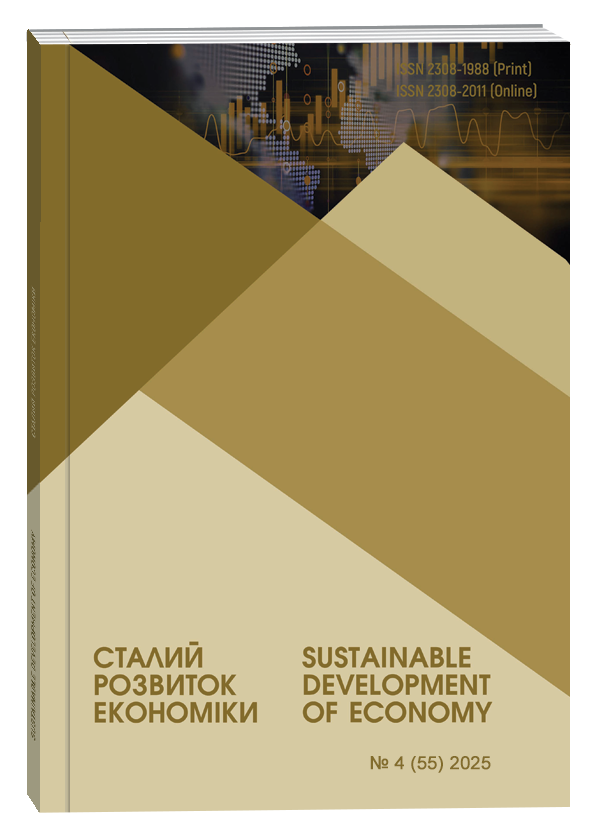HUMAN CAPITAL AS AN OBJECT OF FINANCIAL CONTROL
Abstract
The article substantiates the feasibility of considering human capital as a full-fledged object of financial controlling, analyzes modern approaches to its assessment within the framework of the financial management system of an enterprise, and also determines the role of financial controlling in increasing the efficiency of human capital management. The shift in emphasis in value creation in the modern economy from tangible to intangible assets emphasizes the importance of knowledge, skills, motivation, and loyalty as key factors of organizational success. Despite the growing importance of human capital, traditional accounting and control systems still underestimate it. The author outlines the main reasons for integrating human capital into financial controlling: strategic importance, capital intensity of investments, long-term impact, the need for assessing effectiveness and supporting rational management decisions. The article considers the main approaches to assessing human capital, namely, cost, income, market, and based on key performance indicators, and analyzes their application in the financial controlling system. The essence of each approach, advantages, limitations and practical areas of use are reflected. The article states that financial controlling is an indispensable tool for ensuring effective human capital management, performing a number of key functions. It covers planning investments in personnel, accounting and monitoring costs, analyzing the effectiveness of these investments, identifying "bottlenecks" and potential, supporting the adoption of informed management decisions, and also contributes to the formation of an effective motivation system and provides transparent reporting on the state of human capital. As a result, a conclusion is drawn about the need for the evolution of financial controlling, which should include the systematic integration of human capital metrics related to return on investment, productivity and achievement of strategic goals. This approach ensures sustainable development and competitive advantages in the digital economy.
References
Адонін С. В., Калашнікова Ю. М. Фінансовий контролінг у системі управління підприємством. Ефективна економіка. 2022. № 2. URL: http://www.economy.nayka.com.ua/?op=1&z=10040 (дата звернення: 21.07.2025).
Гоголь Т. А., Дмитренко Д. В. Фінансовий контролінг як система ефективного управління спільною діяльністю підприємств. Фінансові дослідження. 2019. №1(16). URL: https://fr.stu.cn.ua/tmppdf/192.pdf (дата звернення: 21.07.2025).
Кладницька Т., Артімонова І., Кеменяш І., Свиноус, Н. Роль і місце фінансового контролінгу в управлінні фінансових корпорацій. Сталий розвиток економік. 2024. № 2(49). С. 314-318. URL: https://economdevelopment.in.ua/index.php/journal/article/view/980 (дата звернення: 21.07.2025).
Корбутяк А. Г., Шевчук Ю. О. Фінансовий контролінг як складник управління фінансами підприємства. Науковий вісник Ужгородського національного університету. 2021. Вип. 39. С. 89-94. URL: http://www.visnyk-econom.uzhnu.uz.ua/archive/39_2021ua/18.pdf (дата звернення: 21.07.2025р).
Пилипенко Ю. І., Швець А. С. Людський капітал: сутність та фактори розвитку. Економічний вісник. 2023. № 2. С. 15-21 URL: https://ev.nmu.org.ua/docs/2023/2/EV20232_015-021.pdf (дата зверенення: 14.07.2025р).
Плаксюк О., Горватова В., Якушев О. Людський капітал як фактор підвищення ефективності та конкурентоспроможності компанії. Академічний огляд. 2023. № 1 (58). С. 160-174 URL: https://acadrev.duan.edu.ua/images/PDF/2023/1/13.pdf (дата зверенення: 14.07.2025р).
Поліщук Є. А., Іващенко А. І. Методика розрахунку ключових показників ефективності (KPI) використання різних фінансово-кредитних інструментів підприємствами МСБ. Ефективна економіка. 2019. № 2. DOI: https://doi.org/10.32702/2307-2105-2019.2.9 (дата звернення: 15.07.2025).
Сидорчук І. Фінансовий контролінг: організаційно-методичні основи формування та функціонування на підприємстві. Вісник Хмельницького національного університету. 2024. № 6. С. 56-61. URL: https://heraldes.khmnu.edu.ua/index.php/heraldes/article/view/859/1174 (дата звернення: 21.07.2025).
Чуєнков А., Король С. Оцінка капіталів в інтегрованій звітності. Financial and Credit Activity Problems of Theory and Practice. 2023. № 4(51). С. 202–217. DOI: https://doi.org/10.55643/fcaptp.4.51.2023.4115 (дата звернення: 15.07.2025р).
Becker G.S. Investment in Human Capital: A. Theoretical Analysis. Journal of Politikal Economy. 1962. Vol. 70. №. 5. Рp. 9-49. URL: http://www.jstor.org/stable/1829103 (дата звернення: 23.07.2025).
Adonin S. V., Kalashnikova Yu. M. (2022) Finansovyi kontrolinh u systemi upravlinnia pidpryiemstvom [Financial controlling in the enterprise management system]. Efektyvna ekonomika, vol. 2. Available at: http://www.economy.nayka.com.ua/?op=1&z=10040 (accessed: 21.07.2025) (in Ukrainian).
Hohol T. A., Dmytrenko D. V. (2019) Finansovyi kontrolinh yak systema efektyvnoho upravlinnia spilnoiu diialnistiu pidpryiemstv [Financial controlling as a system of effective management of joint activities of enterprises]. Finansovi doslidzhennia, vol. 1(16). Available at: https://fr.stu.cn.ua/tmppdf/192.pdf (accessed: 21.07.2025) (in Ukrainian).
Kladnytska T., Artimonova I., Kemeniash I., Svynous, N. (2024) Rol i mistse finansovoho kontrolinhu v upravlinni finansovykh korporatsii [The role and place of financial controlling in the management of financial corporations]. Stalyi rozvytok ekonomik, vol. 2(49), pp. 314-318. Available at: https://economdevelopment.in.ua/index.php/journal/article/view/980 (accessed: 21.07.2025) (in Ukrainian).
Korbutiak A. H., Shevchuk Yu. O. (2021) Finansovyi kontrolinh yak skladnyk upravlinnia finansamy pidpryiemstva [Financial controlling as a component of enterprise financial management]. Naukovyi visnyk Uzhhorodskoho natsionalnoho universytetu, vol. 39, pp. 89-94. Available at: http://www.visnyk-econom.uzhnu.uz.ua/archive/39_2021ua/18.pdf (accessed: 21.07.2025) (in Ukrainian).
Pylypenko Yu. I., Shvets A. S. (2023) Liudskyi kapital: sutnist ta faktory rozvytku [Human capital: essence and factors of development]. Ekonomichnyi visnyk, vol. 2, pp. 15-21 Available at: https://ev.nmu.org.ua/docs/2023/2/EV20232_015-021.pdf (accessed: 14.07.2025) (in Ukrainian).
Plaksiuk O., Horvatova V., Yakushev O. (2023) Liudskyi kapital yak faktor pidvyshchennia efektyvnosti ta konkurentospromozhnosti kompanii [Human capital as a factor of increasing the company's efficiency and competitiveness]. Akademichnyi ohliad, vol. 1 (58), pp. 160-174. Available at: https://acadrev.duan.edu.ua/images/PDF/2023/1/13.pdf (accessed: 14.07.2025) (in Ukrainian).
Polishchuk Ye. A., Ivashchenko A. I. (2019) Metodyka rozrakhunku kliuchovykh pokaznykiv efektyvnosti (KPI) vykorystannia riznykh finansovo-kredytnykh instrumentiv pidpryiemstvamy MSB [Methodology for calculating key performance indicators (KPI) of the use of various financial and credit instruments by SMEs]. Efektyvna ekonomika, vol. 2. DOI: https://doi.org/10.32702/2307-2105-2019.2.9 (accessed: 15.07.2025) (in Ukrainian).
Sydorchuk I. (2024) Finansovyi kontrolinh: orhanizatsiino-metodychni osnovy formuvannia ta funktsionuvannia na pidpryiemstvi [Financial controlling: organizational and methodological foundations of formation and functioning at the enterprise]. Visnyk Khmelnytskoho natsionalnoho universytetu, vol. 6, pp. 56-61. Available at: https://heraldes.khmnu.edu.ua/index.php/heraldes/article/view/859/1174 (accessed: 21.07.2025) (in Ukrainian).
Chuienkov A., Korol S. (2023) Otsinka kapitaliv v intehrovanii zvitnosti [Capital assessment in integrated reporting]. Financial and Credit Activity Problems of Theory and Practice, vol. 4(51), pp. 202–217. DOI: https://doi.org/10.55643/fcaptp.4.51.2023.4115 (accessed: 15.07.2025) (in Ukrainian).
Becker G. S. (1962). Investment in Human Capital: A Theoretical Analysis. Journal of Political Economy, vol. 70(5), pp. 9–49. Available at: http://www.jstor.org/stable/1829103 (accessed: 23.07.2025)


